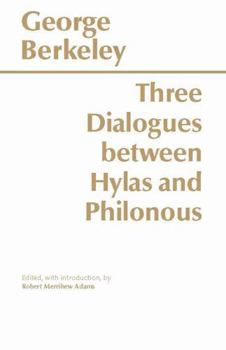Three Dialogues Between Hylas and Philonous.
Select Format
Select Condition 
Book Overview
Three Dialogues Between Hylas and Philonous , by George Berkeley , is a collection of three philosophical dialogues that explore the topics of knowledge, perception, and the idea of materialism.... This description may be from another edition of this product.
Format:Paperback
Language:English
ISBN:0915144611
ISBN13:9780915144617
Release Date:June 1979
Publisher:Hackett Publishing Company
Length:137 Pages
Weight:0.36 lbs.
Dimensions:0.3" x 5.3" x 8.3"
Customer Reviews
2 ratings
A classic of Western Philosophy
Published by Thriftbooks.com User , 21 years ago
Along with Kant, the only Western Philosopher after Plato, worth reading. Bend your mind, and free your soul.
A reader-friendly introduction to Berkeley.
Published by Thriftbooks.com User , 24 years ago
This Oxford Philosophical Texts student edition of George Berkeley's best known work features a helpful introduction, glossary, and notes by philosopher Jonathan Dancy (author of _Berkeley: An Introduction_ and editor of the Oxford Philosophical Texts edition of Berkeley's _Treatise concerning the Principles of Human Knowledge_). The forty-page introduction includes a short biography of Berkeley, a synopsis of the _Dialogues_, a summary and analysis of Berkeley's philosophy including critical discussion of his main arguments, and an exposition of the relation between the _Dialogues_ and the _Principles_. Also featured: a bibliography and an analytical table of contents for the dialogues.As for Berkeley himself, he probably needs no introduction from me. Arguably the most judicious commentary on his thought is that of T.H. Green, who in his great _Introduction_ to Locke and Hume remarked as follows:"His [Berkeley's] purpose was the maintenance of Theism, and a true instinct told him that pure Theism, as distinct from nature-worship and daemonism, has no philosophical foundation, unless it can be shown that there is nothing real apart from thought. But in the hurry of theological advocacy, and under the influence of a misleading terminology, he failed to distinguish this true proposition -- there is nothing real apart from thought -- from this false one, its virtual contradictory -- that there is nothing other than feeling. The confusion was covered, if not caused, by the ambiguity, often noticed, in the use of the term 'idea.' This to Berkeley's generation stood alike for feeling proper . . . and for conception, or an object thought of under relations. . . . Misled by the phrase 'idea of a thing,' we fancy that idea and thing have each a separate reality of their own, and then puzzle ourselves with questions as to how the idea can represent the thing . . . . These questions Berkeley asked and found unanswerable. There were two ways of dealing with them before him. One was to supersede them by a truer view of thought and its object, as together in essential correlation constituting the real; but this way he did not take. The other was to avoid them by merging both thing and idea in the indifference of simple feeling . . . -- an attempt which contradicts itself, since it virtually admits [the] existence [of such oppositions as inner and outer, subjective and objective] while it renders them unaccountable." [_Hume and Locke_, 1968 Apollo edition, pp. 140-142.]This summary may not be quite adequate to Berkeley's thought overall, as later in life he does appear to have come round to a view not altogether unlike Green's. However, it seems to me to be an eminently fair assessment of the Berkeley represented in the present volume.At any rate Berkeley was a fascinating thinker and this volume is as good an introduction to him as is available. The _Dialogues_ should eventually be read in conjunction with the _Principle





